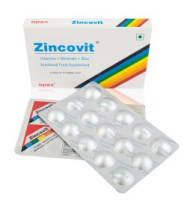NOTICE: unsafe with : Alcohol
USED FOR:
Tuberculosis (TB)
COMPOSITION:
Isoniazid (450mg)
Pyrazinamide (300mg)
Rifampicin (750mg)
Therapeutic Uses:
anti infectives

CAUTION
Triantibin 450 mg/300 mg/750 mg Tablet may cause symptoms such as flushing, increased heartbeat, nausea, thirst, chest pain and low blood pressure with alcohol (Disulfiram reactions).

WEIGH RISKS VS BENEFITS
Triantibin 450 mg/300 mg/750 mg Tablet may be unsafe to use during pregnancy.Animal studies have shown adverse effects on the foetus, however, there are limited human studies. The benefits from use in pregnant women may be acceptable despite the risk. Please consult your doctor.

Triantibin 450 mg/300 mg/750 mg Tablet is probably safe to use during lactation. Limited human data suggests that the drug does not represent a significant risk to the baby.

Do not drive unless you are feeling well.You may feel dizzy or faint, have problems with vision or have other side effects that could affect your ability to drive.

CAUTION
Triantibin 450 mg/300 mg/750 mg Tablet should be used with caution in patients with kidney disease. Dose adjustment of Triantibin 450 mg/300 mg/750 mg Tablet may be needed. Please consult your doctor.

CAUTION
Triantibin 450 mg/300 mg/750 mg Tablet should be used with caution in patients with liver disease. Dose adjustment of Triantibin 450 mg/300 mg/750 mg Tablet may be needed. Please consult your doctor.Regular monitoring of liver function tests is advised before and after the start of the treatment.
Uses of Isoniazid
Isoniazid is used in the treatment of tuberculosisIt is also used to treat inactive (latent) TB .
How to use Isoniazid
Take this medicine in the dose and duration as advised by your doctor. Swallow it as a whole. Do not chew, crush or break it. Triantibin 450 mg/300 mg/750 mg Tablet is to be taken empty stomach.Avoid Triantibin 450 mg/300 mg/750 mg Tablet with tyramine-rich food such as cheese, smoked fish, meats and some types of beer.
How Triantibin 450 mg/300 mg/750 mg Tablet works
Isoniazid is an antibiotic. It works by killing the bacteria that causes tuberculosis.
Common Peripheral neuropathy (tingling and numbness of feet and hand), Increased liver enzymes, Hepatitis (viral infection of liver), Jaundice.
Expert advice for Isoniazid
Take it on an empty stomach (if it upsets your stomach, take it with food). Take it as and when prescribed (in case you skip a dose, do not take two doses at one time). In order to kill the TB bacteria and cure the disease completely, you will have to take this medicine for 6 to 12 months (your doctor will the precise duration for which you will take the medicine). You need to take vitamin B6 (Pyridoxine) along with Isoniazid. Vitamin B6 (Pyridoxine) will prevent possible numbness and tingling fingers and toes that may be caused by Isoniazid.
Q. Is Isoniazid an antibiotic?
Isoniazid is an antibiotic used in the prevention and treatment of tuberculosis or TB (a serious infection caused by bacteria that affects the lungs and in certain cases other parts of the body)
Q. Is Isoniazid chemotherapy/chemotherapy drug?
Isoniazid is a primary antibiotic used for treatment of tuberculosis. Do not confuse it with chemotherapy or chemo drugs used for the treatment of cancer
Q. Is Isoniazid bacteriostatic or bactericidal?
Isoniazid is a bacteriostatic antibiotic. It stops or suppresses growth of tuberculosis causing bacteria by interfering with the formation of protective outer covering (cell wall) which is essential for their growth
Q. Is Isoniazid safe?
Yes. Isoniazid is safe if used at prescribed doses for the prescribed duration as advised by your doctor
Q. Is Isoniazid a MAOI?
Isoniazid has very weak inhibitory activity on enzymes monoamine oxidases (MAO); however it is not used as a monoamine oxidase inhibitor (MAOI)
Q. Is Isoniazid a sulfa drug?
No. The chemical structure and mechanism of action of Isoniazid is different from sulfa drugs
Q. Is Isoniazid an inducer or inhibitor?
Isoniazid is an inhibitor (decreases activity) of an important liver enzyme system that is responsible for the final processing and elimination of several drugs from the body
Q. Can I take isoniazid with ibuprofen/Benadryl/Nyquil/Aleve/Mucinex/amoxicillin?
There no known serious drug interactions of isoniazid with ibuprofen, paracetamol (trade name: Tylenol), naproxen (trade name: Aleve), amoxicillin or any active drug present in Nyquil or Mucinex. Please inform your doctor about all the medication you are currently taking to avoid interactions that may reduce effectiveness of any treatment or aggravate side effects
Q. Does Isoniazid cause weight loss/weight gain/hair loss/diarrhea/affect menstruation?
Changes in body weight (gain/loss), hair loss, diarrhea or changes in menstruation are not among the known side effects of Isoniazid. You may experience few of these side effects while on multi drug (including Isoniazid) treatment for tuberculosis
Q. Does Isoniazid cause acne/make you tired/cause constipation?
You may experience unusual tiredness, constipation or acne while on treatment with Isoniazid. Please inform your doctor about all the medication you are currently taking to avoid interactions that may reduce effectiveness of any treatment or aggravate side effects
Q. Does Isoniazid affect birth control?
Isoniazid has no known interaction with commonly used oral contraceptives (birth control pills). However, multidrug treatment for tuberculosis contains active drug rifampin that decreases the effectiveness of oral contraceptives and hampers birth control.
Uses of Pyrazinamide
Pyrazinamide is used in the treatment of tuberculosis.
How to use Pyrazinamide
Take this medicine in the dose and duration as advised by your doctor. Swallow it as a whole. Do not chew, crush or break it. Triantibin 450 mg/300 mg/750 mg Tablet is to be taken empty stomach.Avoid Triantibin 450 mg/300 mg/750 mg Tablet with tyramine-rich food such as cheese, smoked fish, meats and some types of beer.
How Triantibin 450 mg/300 mg/750 mg Tablet works
Pyrazinamide is an antibiotic. It works by slowing the growth of bacteria that causes tuberculosis.
Common Jaundice, Hepatitis (viral infection of liver), Increased liver enzymes, Joint pain.
Expert advice for Pyrazinamide
Avoid alcoholic beverages while taking this drug.
Do not have any immunizations/vaccinations while using this medication without the consent of your doctor.
Contact your doctor immediately if you experience symptoms such as persistent nausea, vomiting, feeling of discomfort (malaise) or jaundice (abnormal liver function causing yellowing of skin and eyes) while taking pyrazinamide. It indicates that you are developing liver disease.
Constant monitoring of liver function (especially levels of enzymes aspartate transferase [AST] and alanine transferase [ALT]) and blood uric acid levels is advised while on treatment with pyrazinamide.
Do consult your doctor before taking pyrazinamide if you are pregnant or planning to become pregnant.
Do not use pyrazinamide, if you are breast-feeding.
Do not stop taking pyrazinamide without consulting your doctor.
If you forget to take a dose of pyrazinamide, take it as soon as you remember. Do not double the dose to make up for the missed dose.
Do consult your doctor if you are taking oral contraceptive medications (hormonal birth control pills) for birth control. Your doctor may ask you to use other means of birth control (eg. condom, diaphragm with spermicide) to prevent pregnancy while taking pyrazinamide.
Q. What is Pyrazinamide and what is it used for?
Pyrazinamide is an antibiotic. It is used in combination with other antibiotics in the treatment of tuberculosis
Q. Is Pyrazinamide bactericidal?
Pyrazinamide is both a bacteriostatic and a bactericidal antibiotic. It stops the growth of bacteria (bacteriostatic) in certain cases and kills (bactericidal) the tuberculosis causing bacteria in other cases
Q. How does Pyrazinamide work/treat tuberculosis?
Pyrazinamide kills or stops growth of bacteria that causes tuberculosis (Mycobacterium tuberculosis). The exact mechanism of action for Pyrazinamide is not known
Q. How does Pyrazinamide cause hyperuricemia and gout?
Following oral intake of Pyrazinamide, it gets converted in the body to pyrazinoic acid (active chemical form of Pyrazinamide). Pyrazinoic acid blocks the excretion of urates (salt form of uric acid) by the kidneys. This causes an increase in blood levels of uric acid (hyperuricemia). Excess uric acid accumulation between joints causes pain, swelling, redness and stiffness in joints (gout).
Uses of Rifampicin
Rifampicin is used in the treatment of tuberculosis and leprosy.
How to use Rifampicin
Take this medicine in the dose and duration as advised by your doctor. Swallow it as a whole. Do not chew, crush or break it. Triantibin 450 mg/300 mg/750 mg Tablet is to be taken empty stomach.Avoid Triantibin 450 mg/300 mg/750 mg Tablet with tyramine-rich food such as cheese, smoked fish, meats and some types of beer.
How Triantibin 450 mg/300 mg/750 mg Tablet works
Rifampicin is an antibiotic. It works by killing the bacteria that cause infections.
Common Skin rash, Nausea, Vomiting, Chills, Muscle pain.
Expert advice for Rifampicin
Rifampin interacts with many drugs. Please inform your doctor about all the medication you are currently taking to avoid interactions that may reduce effectiveness of any treatment or aggravate side effects.
Do consult your doctor before taking rifampin if you wear contact lenses. Using rifampin may permanently stain your contact lenses.
Taking rifampin may produce a brownish-red coloration of the urine, sweat, sputum and tears. This is not a harmful effect.
Do consult your doctor before taking rifampin if you are pregnant or planning to become pregnant.
Do consult your doctor if you are taking oral contraceptive medications for birth control. Your doctor may ask you to use other means of birth control (eg. condom, diaphragm with spermicide) to prevent pregnancy while taking rifampin.
Do consult your doctor before taking rifampin if you are breast-feeding.
Do consult your doctor before taking rifampin if you are aged 65 years or above.
If you take rifampin irregularly or if daily administration is resumed after a drug free interval, you may experience ‘flu syndrome’ (includes episodes of fever, chills, headache, dizziness, and bone pain).
Rifampin should preferably be taken in the morning before breakfast. Taking rifampin with food is known to delay its absorption (process by which the active drug reaches the affected site in the body via blood circulation) thereby, hampering its effectiveness.
Do not stop taking rifampin without consulting your doctor.
Q. Is rifampin and Rifampicin same?
Yes. Rifampin (nomenclature in the United States) and Rifampicin (nomenclature in Britain) is the same antibiotic commonly used in the treatment of tuberculosis and leprosy
Q. Is rifampin a penicillin/amoxicillin/sulfa drug?
No. Rifampin is an antibiotic commonly used in the treatment of tuberculosis and leprosy. It has a structure and mechanism of action different from penicillin or amoxicillin (amoxicillin belongs to the class of penicillin antibiotics). The chemical structure and mechanism of action of rifampin is different from sulfa drugs
Q. Is rifampin bacteriostatic or bactericidal?
Rifampin is a bactericidal drug. It acts by blocking the activity of a bacterial enzyme called DNA-dependent RNA polymerase which essential for important life processes in the bacteria, thereby killing the bacteria
Q. Is rifampin an inducer or inhibitor?
Rifampin is an inducer (increases activity) of an important liver enzyme system that is responsible for the final processing and elimination of several drugs from the body
Q. What is R-cin 600 used for?
R-cin 600 is a trade name for active drug rifampin 600 mg. Rifampin is an antibiotic commonly used in the treatment of tuberculosis and leprosy. It is also used in the prevention of meningococcal meningitis and Haemophilus influenza infections. It may also be used in combination with other drugs to treat infections-Brucellosis, Legionnaires disease or serious staphylococcal infections
Q. What is R-cinex/Macox plus/R-cinex 600?
R-cinex and Macox plus are trade names for a combination of active drugs rifampin and isoniazid. It is used in the treatment of tuberculosis. R-cinex 600 and Macox plus contains 600 mg of active drug rifampin and 300 mg of active drug isoniazid
Q. Can I take rifampin with ibuprofen/acetaminophen (Tylenol)?
Rifampin has no known serious drug interaction with ibuprofen or acetaminophen (trade name: Tylenol). Inform your doctor about all the medication you are currently taking to avoid interactions that may reduce effectiveness of any treatment or aggravate side effects
Q. Does rifampin cause weight gain/weight loss/ hair loss/ constipation/ yeast infection?
No. Changes in body weight, hair loss or triggering constipation are not among the known side effects of rifampin. Rifampin is an antibiotic commonly used in the treatment of tuberculosis and leprosy. It has no known effect on causing yeast infections
Q. Does rifampin cause headaches?
Yes. Headache is a possible side effect of rifampin
Q. Does rifampin change urine color/turn urine orange?
Yes. Taking rifampin may change the color of your urine (skin, sweat, saliva, tears and feces) to brownish-red or orange. This effect is not harmful
Q. Does rifampin cause liver damage?
Rifampin is safe when used at prescribed doses for the prescribed duration. Constant monitoring of liver function is important while on treatment with rifampin. Taking drugs like saquinavir, ritonavir with rifampin can cause severe liver damage. Do consult your doctor if you have any liver problem before taking rifampin.


 Triantibin 450 mg/300 mg/750 mg Tablet
Triantibin 450 mg/300 mg/750 mg Tablet  Bookmark
Bookmark





















